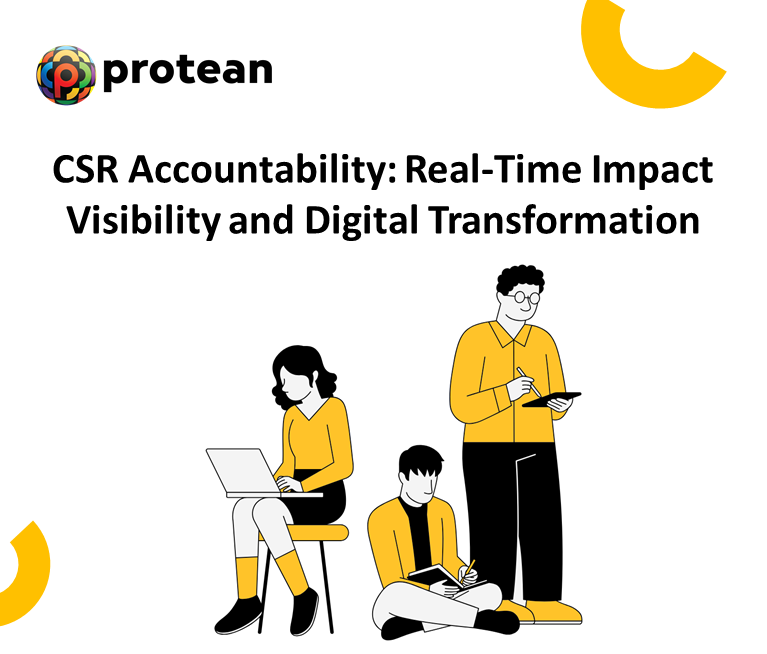India's corporate social responsibility landscape is flourishing. Driven by Section 135 of the Companies Act, corporate India spent approximately ₹34,909 crore on CSR activities in FY 2023–24. Since the mandate began, companies have collectively spent over ₹1.53 lakh crore on CSR activities between 2014 and 2022.
Despite this immense financial commitment, a critical gap persists: impact visibility. The true challenge lies in converting "activity-based" CSR—simply spending the funds—into "impact-driven" CSR—showing demonstrable, measurable change. Too often, CSR reports still fail to show measurable change. The majority of projects still lack transparent, outcome-linked reporting. The India CSR Outlook Report 2024 confirms this fragmentation, noting that 65% of organisations implemented only 1–5 CSR projects, reflecting a small-scale approach to impact. This lack of transparency and real-time data compromises credibility and hinders strategic decision-making.
The Monitoring Gap: Why Retrospective Reports Fall Short
The fundamental problem is one of monitoring and data flow. CSR reporting is still largely focused on inputs and activities rather than actual outcomes. Data flows remain fragmented across funders, NGOs, and auditors. Without live visibility, it’s difficult to measure what’s truly changing on the ground.
"Impact Reports" often fall short because of three structural weaknesses:
1. Retrospective Nature
Reports are typically prepared post-project completion, offering little value for mid-course correction or adjustment of strategy.
2. Output over Outcome
Reporting often focuses on simple outputs (e.g., counting beneficiaries reached, funds spent) instead of assessing how lives genuinely changed (the outcome).
3. Lack of Standard Metrics
There is often no uniform Key Performance Indicator (KPI) framework across sectors or between different projects, making meaningful comparison and aggregation impossible.
The data confirms this lag: The State of Impact Reporting in India 2024 (KPMG) found that even after the mandatory impact assessment rule for CSR projects above ₹1 crore, less than 40% of companies use structured, outcome-based frameworks.
| Also Read: How CSR Tech Can Transform Under-Served Regions in India |
The Tech-Driven Shift: Redefining Accountability
The solution to closing this visibility gap lies in embracing digital infrastructure. Advanced tools are revolutionizing how CSR outcomes are tracked. Accountability is moving from being a year-end task to a continuous, data-driven process.
Tools now available include:
1. Digital Impact Boards and Real-Time Dashboards
These Management Information Systems (MIS) enable instant viewing of project progress, fund utilization, and beneficiary data.
2. Data Validation
Technologies like geo-tagging, fund-flow dashboards, and AI-based validation are effectively reducing data loss and reporting delays.
3. Faster Cycles
Early adopters of digital monitoring have reported significantly faster reporting cycles and higher data accuracy.
These innovations allow CSR leaders to verify the authenticity of project progress, ensuring that funds are utilized correctly and impact claims are fully substantiated.
Subtle Integration: The Protean Approach to Verifiable Impact
The shift to digital accountability requires platforms built specifically for the Indian CSR ecosystem—platforms that manage the entire lifecycle transparently without adding operational complexity.
This is where Protean’s specialized digital architecture comes into play:
1. Protean Life
This platform digitizes the entire CSR lifecycle. It handles everything from partner monitoring and project discovery to fund tracking and comprehensive impact analytics, making reporting seamless and credible.
2. Vidyasaarathi
Specifically focused on education CSR, Vidyasaarathi operates within this secure ecosystem. It ensures traceability for every student, managing the process from scholarship application to skilling interventions.
By working together, Protean Life and Vidyasaarathi exemplify how digital infrastructure can make CSR visible, verifiable, and value-driven. They transform complex, fragmented data into clear, auditable insights, turning accountability into a continuous process, not a year-end task.
| Also Read: What young India really needs from CSR |
Why Impact Visibility is Central to CSR's Credibility
The mandate for greater visibility is driven by a critical need for sustained trust:
1. Credibility Sustains Trust
Visibility builds credibility, and credibility is what sustains stakeholder trust in the long term.
2. Demand for Proof of Purpose
Stakeholders and company boards now demand proof of purpose, moving beyond simple promises and focusing on verified outcomes.
3. Tangible Outcomes
In high-impact areas like education and skilling, verified beneficiary outcomes—such as successful job placements or skill certifications—become tangible indicators of real, transformative impact.
The Final Note
India's CSR narrative is rapidly shifting from measuring inputs to showcasing measurable results. The next phase of CSR will be defined not by how much is given, but by how transparently it’s tracked. By embracing digital platforms, CSR teams can move from simply preparing impact reports to actively demonstrating real-time impact visibility.

